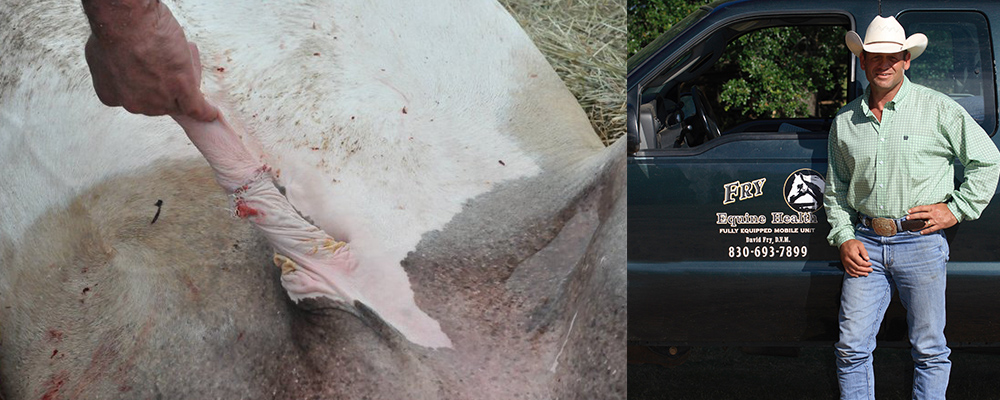
Equine Health & Wellness Exams
Giving vaccinations to your horse is only a small part of annual or bi-annual exams by Dr. Fry. He believes the importance of a physical examination many times is underrated as being a major focus of an equine’s healthcare investment.
Performing a thorough physical examination of your horse is one of the most important issues learned in veterinary school. The physical examination is an evaluation of an equine using all of the vet’s senses in an effort to assess a horse for any problems – preferably before they cause more serious problems. Examples of this are detecting White Line disease or Thrush BEFORE a horse becomes lame…or finding dental problems BEFORE the horse start dropping feed or losing weight. With an unhealthy equine, a physical exam combined with diagnostic tools helps create and establish a treatment plan for the horse. This also helps establish the correct relationship between the owner, the horse and the vet – which is now legally required for your vet to prescribe medications, sign health related document or provide over-the-phone consultations if required. Without the knowledge provided by a wellness exam, this simply is not possible.
NOTE: Not currently doing Coggins or Health Certificates
The things Dr. Fry evaluates on your horse are:
• Description: The name, age, breed and gender of your horse.
• Basic Assessment: Mental status, personality and general wellness of the horse. Is it quiet, responsive, bright, alert, unresponsive, nervous, dull, etc.
• Weight: Visually examining the girth of the horse to estimate weight for baseline. This allows monitoring or weight and helps with medicines dosage calculating.
• Temperature: Sometimes a rectal temperature is taken even with healthy horses to verify it is within the normal temperature range of 99 to 101.5 degrees.
• Coat Condition: Observing the evenness of the coat, it shine and shedding are all indicators of deficiencies or some diseases.
• Heart Rate & Rhythm and Sounds: Using a stethoscope to listen for arrhythmia, murmurs and heart beat rate.
• Lung Sounds & Respiratory Rate: The stethoscope is again used to evaluate both side of equine for abnormalities and sounds indicating conditions such as pneumonia or heaves.
• Gut Sounds: Using the stethoscope to evaluate all four quadrants of the horse to hear anything indicative of ailments of the intestines and stomach areas.
• Eyes: Assessed for normal structure, discharge, cataracts, cornea issues, inflammation, pupil constriction and vision.
• Nose: Assessed for air flow and discharge.
• Legs & Hooves: There are many issues that can be identified by assessing the legs and hooves of the horse. Checking for digital pulses, heat in the hoof, founder lines, range of motion, swelling, crackling of joints, pain and diseases of the hoof like white line and Thrush. Hoof health cannot be overstated. It is very important in equines.
• Teeth: Checking for points and hooks on various teeth. If the horses teeth are preventing it from grinding and chewing correctly, it cannot absorb the nutrients from its food properly. Dr. Fry has the training, experience and ability to correct these issues with dental work if required and/or to perform a more complete dental exam on the horse.
Other services offered include:
- Health and Wellness Exams
- Comprehensive Onsite Facility Reviews
- Nutrition Program Reviews
- Internal Medicine
- Performance Enhancing Dentistry
- Equine Reproductive Services
- Referral Services
- Bovine Services for Large Herds
- 24/7 Emergency Service for current and active clients

